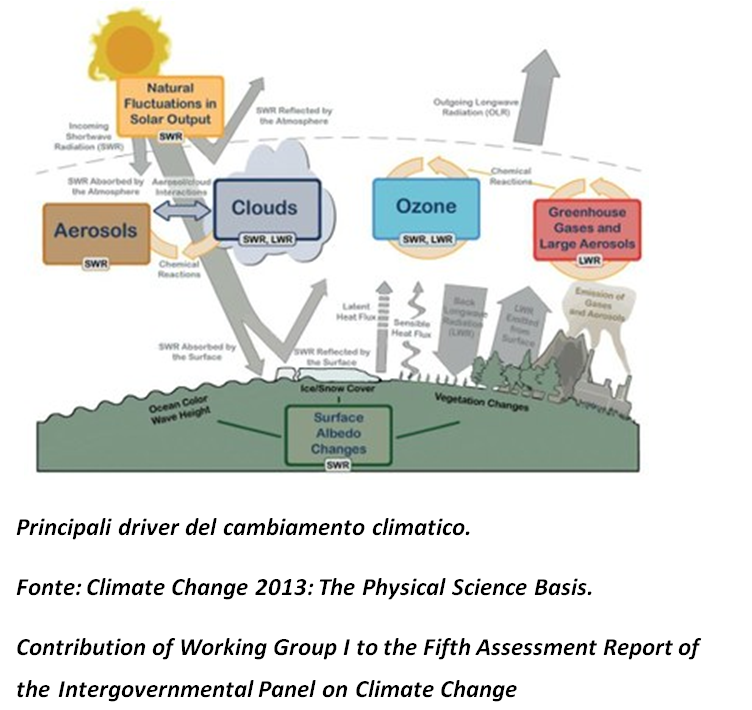Climate change
"Climate is what you expect, weather is what you get" (Edward Lorenz, 1961)
 Since the middle of last century fast climate change have been observed by scientists. The earth's climate is subject to seasonal fluctuations, decadal and centuries-old that are related with natural causes such as the Earth's orbit, solar radiation, ocean circulation and volcanic eruptions (climate variability).
Since the middle of last century fast climate change have been observed by scientists. The earth's climate is subject to seasonal fluctuations, decadal and centuries-old that are related with natural causes such as the Earth's orbit, solar radiation, ocean circulation and volcanic eruptions (climate variability).
During the last years, however, more deep and rapid changes of the climate system have been determined by human being, above all due to the increase of greenhouse gas emissions into the atmosphere. With the first global conference on climate change in 1979, scientists have started to study about how to predict and prevent potential man-made changes in nature and that could have a negative effect on the welfare of humanity.
Sixth IPCC Report
The IPCC (Intergovernmental Panel on Climate Change) is the world's highest meeting of climate experts. The IPCC has the task of evaluating the information available in the scientific, technical and socio-economic fields related to climate change, its possible impacts and adaptation and mitigation options. The first volume of the latest IPCC report of 2021 (AR6) confirms that the Earth's climate is warming (the average temperature on the Earth's surface for the period 2001-2020 higher by about 1°C compared to 1850-1900) and that the human impact on the climate system is unequivocal. Climate change involves not only global warming but also an intensification of the hydrogeological cycle. Globally this leads to an increase in evaporation and precipitation. At the regional level, the impacts depend on the region. The Mediterranean basin is considered a particularly vulnerable area (hot spot) to climate change. For the future, a further increase in greenhouse gas emissions could be associated with other significant changes compared to the past, such as further warming, changes in the amount and type of precipitation, rise in sea levels and changes in the frequency and intensity of extreme climatic events (floods, droughts, cyclones, etc.). Even if the growth of greenhouse gas concentrations in the atmosphere were halted during this century, climate change and sea level rise caused by past, current and future human activities would continue for centuries.
-
BolognaMay 09, 2025 — May 11, 2025Invent, innovate and transform the future of cultural heritage with Copernicus
-
Apr 12, 2025 02:30 PM — Apr 12, 2025 03:30 PMAdapting Communities
-
Mar 22, 2025 — Mar 22, 2025World Water Day 2025
-
Mar 21, 2025ISPRA researchers selected to draft the 2027 Methodological Report on Short-Lived Climate Forcers (SLCF)
-
Mar 14, 2025 09:30 AM — Mar 14, 2025 12:00 PMManagement of drought risk and water crises
- Urban nature Plans: tools to bring nature back into our lives?
- Environment in Italy: an overview. Environmental Data Yearbook 2023
- Atlas of Environmental Data. Edition 2024
- Efficiency and decarbonization indicators in Italy and in the biggest European Countries – Edition 2024
- Italian Emission Inventory 1990-2022. Informative Inventory Report 2024
- Greenhouse gas emissions in Italy. Reduction targets for 2030
- Italian Greenhouse Gas Inventory 1990-2022. National Inventory Report 2024
- Towards resilient cities: the interventions of the experimental Program for adaptation to climate change in urban areas
- ITALY and ENVIRONMENT: Status, Prospects and Scenarios
- Nationwide hydrological water budget: focus on drought and natural availability of renewable water resources. Update to 2022.
